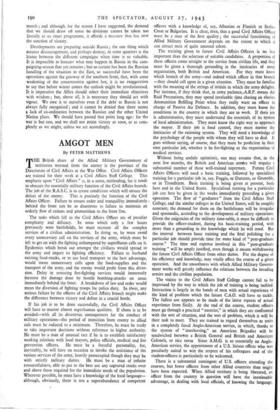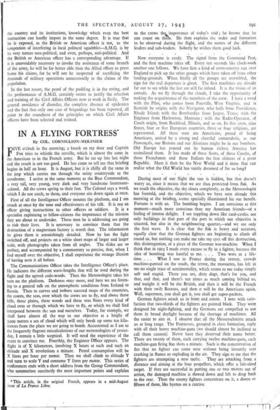AMGOT MEN
By PETER MATTHEWS The tasks which fall to the Civil Affairs Officer are of peculiar complexity and delicacy. In areas which only a few hours previously were battlefields, he must recreate all the complex services of a civilian administration. In doing so, he must avoid every unnecessary call on the services of the army, which must be left to get on with the fighting unhampered by superfluous calls on it. Epidemics which break out amongst the civilians would spread to the army and impair its fighting efficiency. Failure to husband existing food-stocks, or to use local transport to the best advantage, would "mean unnecessary calls upon the food-supplies and the transport of the army, and the enemy would profit from this diver- sion. Delay in restoring fire-fighting services would immensely increase the damage done by hostile bombing-attacks on areas immediately behind the front. A breakdown of law and order would mean the diversion of fighting troops for police duty. In short, any serious failure by the officers of the Civil Affairs branch might make the difference between victory and defeat in a crucial battle.
If his job is to be done successfully, the Civil Affairs Officer will have to muster almost superhuman qualities. If chaos is to be avoided—with all its disastrous consequences for the conduct of military operations—the period of transition from enemy to allied rule must be reduced to a minimum. Therefore, he must be ready to take important decisions without reference to higher authority. He must be a man of unusual tact if he is to establish satisfactory working relations with local mayors, police officials, medical and fire prevention officers. He must be a forceful personality, for, inevitably, he will have on occasion to invoke the assistance of the various services of the army, heavily preoccupied though they may be with strictly military duties. He must be a man of infinite resourcefulness, able to put to the best use any captured stocks over and above those required for the immediate needs of the population. Wherever possible, he must have a knowledge of the local language— although, obviously, there is not a superabundance of competent officers with a knowledge of, say, Albanian or Finnish or Serbo- Croat or Bulgarian. It is clear, then, that a good Civil Affairs Officer must be a man of the first quality ; the successful' functioning of Allied Military Government depends on the extent to which it can attract men of quite unusual talent. - The training given to future Civil Affairs Officers is no less important than the selection of suitable candidates. A proportion of these officers come straight to the service from civilian life, and they must be given a thorough grounding in the intricacies of army organisation, both British and American. For they must know which branch of the army—and indeed which officer in that branch —they should call upon in a given situation. They must be familiar with the meaning of the strings of initials in which the army delights. For instance, if they think that, in army parlance,-A.R.P. means Air Raid Precautions, they may spend invaluable time chasing an elusive Ammunition Refilling Point when they really want an officer in charge of Passive Air Defence. In addition, they must know the conditions in the country in which they are to work. If their job is administrative, they must understand the essentials of its system of local administration. They must know the right way to approach the mayor. If their job is food control, they must master the intricacies of the rationing system. They will need a knowledge of the psychology of the people with whom they will have to deal. It goes without saying, of course, that they must be proficient in their own particular job, whether it be fires-fighting or the organisation of medical services.
Without being unduly optimistic, one may assume that, in the next few months, the British and American armies will require a substantial number of these well-trained supermen. Future Civil Affairs Officers will need a basic training, followed by specialised training for a particular job in, say, Foggia, or Durazzo, or Grenoble, or in Trondhjem. Basic training is being given at present, both here and in the United States. Specialised training for a particular job can best be given in the weeks immediately preceding a given operation. The flow of " graduates " from the Civil Affairs Staff College, and the similar colleges in the United States, will be roughly constant; the demand for them on the battlefronts will be irregular and spasmodic, according to the development of military operations. Given the exigencies of the military time-table, it must be difficult to provide the officer-student, during his basic-training period, with more than a grounding in the knowledge which he will need. But the interval between basic training and the final polishing for a particular job should piovide time for some kind of " post-graduate course." The time and expense involved in this " post-graduate training " will be amply justified, even though it means withdrawing the future Civil Affairs Officer from other duties. For the degree of his efficiency and knowledge may vitally affect the course of a given operation. And the smoothness with which Allied Military Govern- ment works will greatly influence the relations between the invading armies and the civilian population.
The visitor to the Civil Affairs Staff College cannot fail to be impressed by the way in which the job of training is being tackled. Instruction is largely in the hands of men with actual experience of the kind of problem which the future C.A.O. will have to tackle. The fullest use appears to be made of the latest reports of actual experience from Sicily. At the end of the course, student officers must go through a practical " exercise," in which they are confronted with the sort of situation, and the sort of problem, which it will be their task to meet. They are trained to regard themselves as units in a completely fused Anglo-American service, in which, thanks to the system of • " interleaving," an American Brigadier will be sandwiched between a British General and British and American Colonels, or vice versa. Since A.M.G. is so essentially an Anglo- American service, the appointment of a U.S. liaison officer who was peculiarly suited to win the respect of his colleagues and of the student-officers is particularly to be welcomed.
There is a substantial contingent of U.S. officers attending the courses, but fewer officers from other Allied countries than might have been expected. When Allied territory is being liberated, an officer from the country in question will have the inestimable advantage, in dealing with local officials, of knowing the language, the country and its institutions, knowledge which even the best instruction can hardly impart in the same degree. It is true that he is exposed, as the British or American officer is not, to the temptation of interfering in local political squabbles—A.M.G. is by its very nature non-political, and even, perhaps, anti-political. And the British or American officer has a corresponding advantage. If it is unavoidably necessary to invoke the assistance of some branch of the army, he will be far better able than the Allied officer to press home his claims, for he will not be suspected of sacrificing the demands of military operations unnecessarily to the claims of the population.
In the last resort, the proof of the pudding is in the eating, and the performance of A.M.G. certainly 'seems to justify the selection and training of the Civil Affairs Officers now at work in Sicily. The general avoidance of disOrder, the complete absence of epidemics and the fact that only one case of brigandage has been reported, all point to the soundness of the principles on which Civil Affairs officers have been selected and trained.























 Previous page
Previous page